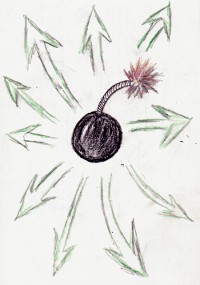Since I turned 35 (last year), I like to fantasize about what I’d do if I were elected Supreme Leader of the United States of America. My fantasies are exaggerations of possibility, of course, but I like to think they’re reasonable exaggerations, which are technically feasible and almost socially & legally possible, as opposed to god-like changes. Here are a few of my bigger ideas / fantasy campaign promises:
Mandatory Sterilization for All
This is less about population control than it is about addressing the problems of abortion and unwanted children. There’s such heated debate about whether abortion should be allowed, wouldn’t it be better to stop the root cause of this, which is unwanted pregnancy? Here’s the concept:
- Develop lifelong but reversible sterilization techniques (or perfect existing techniques)
Continue reading “LuQ for Prez”




